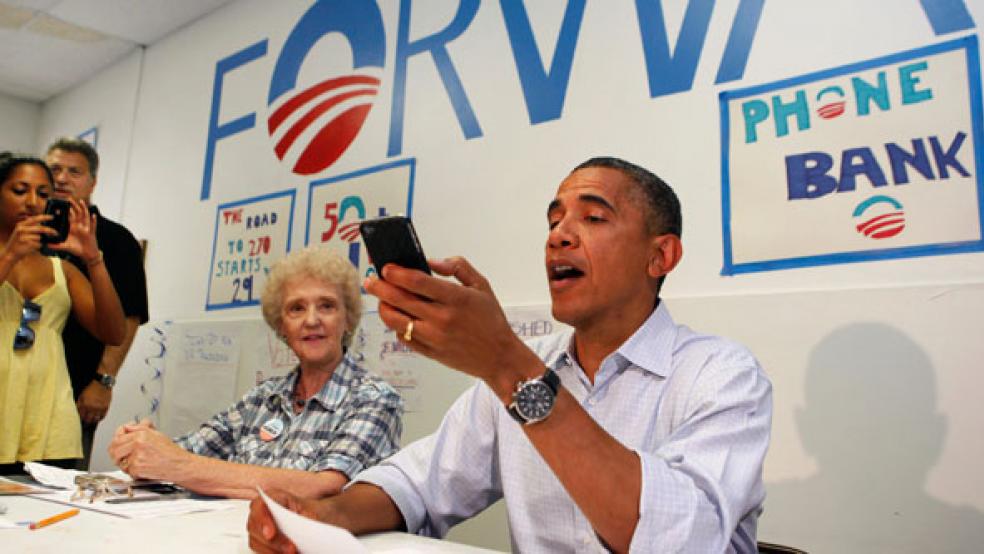President Obama raised more money than challenger Mitt Romney in August for the first time in three months, a sign that the Republican spending advantage in the fall could be smaller than previously thought.
The president’s reelection campaign said Monday that, along with the Democratic National Committee, it raised $114 million in August, slightly besting the $112 million Romney raised in conjunction with the Republican National Committee.
Obama’s total is a significant increase over the $76 million he raised in July and comes just a week after his campaign announced it had raked in contributions from 3.2 million people, more than who supported his groundbreaking 2008 campaign. The end of the fundraising month coincided with a new program to accept donations via phone text messages. And it came at the same time as the Republican convention, a large media event that likely drove Obama supporters to their wallets.
“The key to fighting back against the special interests writing limitless checks to support Mitt Romney is growing our donor base,” Obama campaign manager Jim Messina said in a statement.
Both candidates are collecting checks of up to $73,300 by soliciting money for their parties, but the Obama campaign has focused more on collecting small donations from large numbers of people, which could give it a strategic advantage this fall. Election law allows the small donations to go directly to the campaign, giving Obama advisers more control over spending and lower rates for television airtime.
“We will continue the hard work of raising the resources so that Mitt Romney and Paul Ryan can win in November,” Romney and RNC officials said in a statement. The ticket is “offering bold solutions to our country’s problems — that is why we are seeing such tremendous support from donors across the country.”
The president has been spending much more than his challenger, both on advertising and swing-state staff who organize volunteers making person-to-person voter contacts. Overall for the two-year election cycle, Obama and the DNC have spent $481 million through July, compared with $334 million for Romney and the RNC.
Obama’s campaign has nonetheless claimed that the president will be outspent this year, and Obama himself said in a July e-mail to supporters that it would be “a first for a sitting president.” A Washington Post analysis, however, shows that it was the challenger who raised more in at least three of the past five presidential elections featuring an incumbent.
Frustration with a sitting president tends to be a bigger motivation for donors than a pitch for reelection, making Obama’s slight edge in August all the more noteworthy. In 2004, Democratic challenger Sen. John F. Kerry (Mass.) outraised President George W. Bush every month after securing the Democratic nomination. In the cases where incumbents raised more overall, it was largely due to spending caps in the public financing system.
After several months of big fundraising and low spending, Romney and his party have more money in the bank for fall — a $60 million advantage as of July 31, the latest information available. Well-funded conservative interest groups are expected to give Romney a further boost in the next two months.
The fall campaign will be the first time that both major party candidates have turned down public financing and its accompanying spending cap. Obama was the first candidate to opt out of the program in 2008, giving him a big advantage over Republican candidate Sen. John McCain (Ariz.), who took the public funds.
Obama’s success with small donors could help tip the scales further in the fall because he can go back to the vast majority of his 3.2 million donors to ask for more money. Romney’s heavier reliance on wealthy donors means his biggest source of funds is tapped out because those big donors have already reached the maximum amount allowed under the law.
“You’d much rather have three million people who have already donated than try to find three million new ones,” said Bob Biersack, a senior fellow at the nonpartisan Center for Responsive Politics.
The addition of Rep. Paul Ryan to the Republican ticket could give Romney a much needed boost in small donor contributions. The Wisconsin lawmaker has been a favorite of the GOP base and has drawn large numbers of small donors to his House campaign, an unusual achievement helped in part by his big spending on direct mail.
Under a plan approved by the Federal Election Commission last month, the campaigns have begun accepting donations to be charged to their supporters’ cellphone bills, a system activated by a text message to the campaign. Both the Romney and Obama campaigns asked for the system, but Democrats rolled it out a week earlier, allowing them to use it during both conventions. Republicans did not have the system in place for their own convention.

